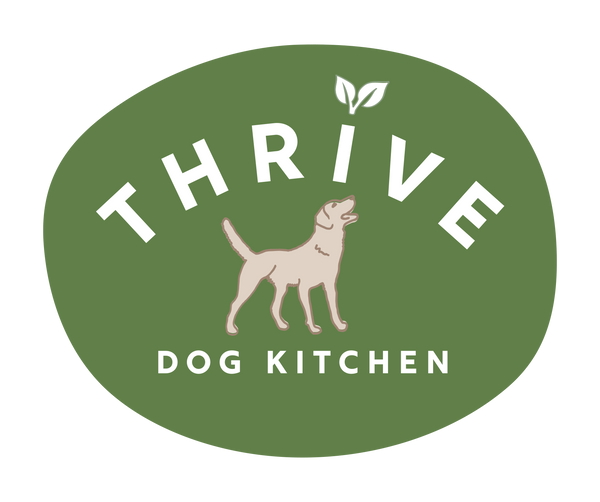
Blueberries for Dogs: The Health Benefits
Share
Are Blueberries Good for Dogs?
Here at Thrive Dog Kitchen we support and encourage the inclusion of fruits in your dog’s meals. Many fruits are rich in vitamins, minerals and other nutrients that will enable your dog to thrive.
This includes blueberries. Blueberries are a great fruit to feed your dog. We love them so much we include them in our Original Blend.
Whether your dog eats kibble, fresh food, raw, freeze-dried or something in between a sprinkle of blueberries will give your dog’s next meal an extra nutritious boost.
Benefits of Blueberries for Dogs
The blueberry might be tiny in size, but it is huge when it comes to beneficial nutrients for your dog. Often referred to as a superfood, blueberries benefit the heart, brain, blood sugar, gut microbiome, and inhibit tumour growth.
Nutrient Profile of Blueberries
Glycemic Load - Blueberries have low glycemic load of 8, which is a good thing.
Fibre - supports good digestion, as well as beneficial bacteria in their intestines. Prevents the overgrowth of bad bacteria.
Vitamin K1 - strengthens bones, promotes healthy blood coagulation; prevents anaemia; promotes a healthy heart
Vitamin C - reduces inflammation; supports healthy aging; boosts their immune system
Manganese - maintains the health of bone and cartilage; metabolises protein and carbohydrates; assists in kidney and liver function; helps with brain health
Smaller amounts of
Vitamin E – protects against oxidative damage; improved immune system; improved eyesight; healthy skin and coat
Vitamin B6 – promotes health brain function and production of red blood cells.
Copper – enables your dog to make red blood cells and absorb iron;
These nutrients in blueberries make them an ideal addition into your dog’s diet to help support the function of:
- Heart
- Brain
- Joints
- Immunity
- Gut
Antioxidants: Why Blueberries are Called a Superfood
Blueberries have the highest level of antioxidants of fruits and vegetables.
Antioxidants are molecules that fight free radicals, which cause oxidative stress to the body.
Activities that lead to oxidative stress in dogs include:
- Excessive exercise
- Environmental pollution
- Exposure to chemicals, I.e., pesticides
- Consumption of certain foods
- Inflammation
Plant-based foods are the best source of antioxidants.
In blueberries there are three types of antioxidants:
- Anthocyanins – it's the antioxidant that gives blueberries it’s blue/purple pigment. They also contain properties that improve vision, are anti-inflammatory and cardiovascular disease prevention.
- Quercetin – is known as nature’s antihistamine. Quercetin also is anti-inflammatory, anti-pathogenic and an immune regulator. It may slow the development of degenerative diseases.
- Myricetin – studies have found myricetin improves learning and memory capability. It also may fight against cardiovascular disease, inflammation, diabetes and cancer.
Health Benefits of Blueberries
Gut Microbiome – Blueberries are a great source for prebiotic fibre to support gut health. The high levels of antioxidants in blueberries also plays a contributing role in supporting good gut health.
In one study of human volunteers, consumption of a wild blueberry drink for 30 days increased the abundance of Bifidobacterium in the intestinal tract when compared to placebo. Deficiency of bifidobacterium has been found in irritable bowel syndrome. Reduction in bifidobacterium is also associated with non-intestinal diseases such as asthma and obesity.
Brain health – A 2015 study found that rats fed blueberries saw an improvement in their motor performance and improved cognition. In addition, a study in 2017 involving dogs found cognitive improvements of those dogs fed a blueberry extract.
Reduce Oxidative Damage – the high level of antioxidants found in blueberries my prevent oxidative damage which is known to play a role in diseases including cancer, Alzheimer’s disease and heart disease. A 2006 study conducted on sled dogs found those dogs who were supplemented with blueberries had higher levels of antioxidants post exercise, then those that weren’t.
Even Wolves are Known to Eat Blueberries
In July 2019 video footage captured wild wolves in Voyageurs National Park eating wild blueberries. Researchers have previously discovered that wolves regurgitate blueberries for their pups. But this video is considered the first of its kind to highlight the wolves freely consuming blueberries. Reserachers from the Voyageurs Wolf Project have found that wolves' diets will consist of up to 83% blueberries over the berry season.
How Much to Feed
When feeding your dog blueberries, feed in moderation.
Feed 5 blueberries per 5kg of body weight.
Fruit should be no more than 5% of your dog’s daily intake.
Rotate the blueberries with other nourishing fruits to give your dog variety of flavours and nutrients.
How to Feed Blueberries to Dogs
- Sprinkle on top their meal
- Feed frozen blueberries as a treat
- Puree and freeze into ice cube moulds
- Serve a spoonful of Original Blend
Risks and Concerns
If your dog over-indulges in blueberries, the excess amount of fibre may lead to an upset stomach and diarrhoea.
Only feed fresh or frozen blueberries.
Do not feed tinned, sugared, jam or packed in syrup blueberries because the sugar content will be too high for your dog.
The small size of the blueberries may be a choking hazard to puppies or small breed dogs.
Incorporating a small number of blueberries into your dog’s diet whatever they eat will benefit them greatly.
